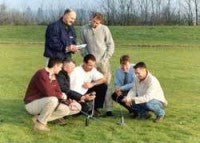Education and Training
Education & Training
By Laurence Gale MSc
Education and training are essential processes required to ensure future progress through life. We are learning and developing new skills and experiences every day and, based on those experiences, are able to determine and make decisions which may benefit our welfare and quality of life. We all continue to learn from life experiences, whether chosen or dictated.
Education is the knowledge or skill obtained or developed by a learning process, whereas training is making someone proficient through instruction and practice. Both go hand in hand.
Whatever profession we choose there is always a need for education and training, which can be taught formally or informally.
In the past it wasn't uncommon for gardeners and groundsmen, without any formal qualifications, and often self taught, to produce and maintain high quality gardens and turf grass surfaces. In the modern world world that situation is no longer acceptable.
The demand from the industry for formal recognition of the skills and experiences of those committed individuals resulted in the wealth of education and training opportunities we have today.

The combination of learning in the working environment alongside seasoned professionals and receiving academic teaching enabled me to develop my knowledge and skills. It is my firm belief that this combination is the most relevant and effective method of learning. It enables practical experiences to be backed up by scientific and technical knowledge. (Link Kings Heath)
Today the turfgrass industry has changed out of all recognition. Turfgrass managers are under a great deal of pressure, and not just those who work at the professional sporting venues. Poorly prepared facilities often lead to poor performance, and possible loss of revenue.
The sports turf leisure industry is now a vast area of opportunity. The following list indicates the scale of the industry with an approximate number of facilities now being operated in the UK:
-
Over 2800 golf courses
-
150 Professional football clubs
-
Over 50,000 non league football clubs
-
2500 plus rugby clubs
-
Over 600 tennis clubs
-
Over 490 local authorities
-
30,000 schools
-
Plus numerous other private schools, garden estates etc.
Although there may seem to be plenty of opportunities for work in this vast industry sector, competition for the better paid jobs is very high, and especially at the more prominent and prestigious facilities. Candidates need to have an edge, and being properly qualified in the appropriate areas can provide the necessary advantage. In addition, the technical advancement of products and machinery has led to the demand for well educated and trained personnel.
Management responsibilities are huge. For example, the job description for a Head Greenkeeper or Course Manager can include the following:-
-
Health & Safety legislation.
-
Staff and employment law.
-
Financial management and budgetary control.
-
Turf management, maintenance regimes for greens etc.
-
Chemical control and environmental issues.
-
Irrigation system management.
-
Machinery control (purchasing, maintaining, repairing).
-
Buildings/stores management.
-
Liasing with golf committees, club members and public.
To ensure that all these activities and services are carried out in a safe and controlled manner it is essential that the manager and his staff have the relevant training, qualifications and experience.
There are a number of governing bodies and institutions promoting education and training in the industry:
-
The Greenkeepers Training Committee (the GTC) is dedicated to its objectives of improving and promoting the education and training of all golf greenkeepers. A comprehensive training manual, published by the GTC in several European languages, helps guide greenkeepers through their chosen career in association with recognised training providers. The GTC promote National/Scottish Vocational Qualifications (N/SVQs) www.the-gtc.co.uk
-
The British and International Greenkeepers Association (BIGGA) is dedicated to the continuing professional development of its members. The key to this progress lies in education and training where the establishment of work based qualifications coupled with improvements in work related qualifications has allowed a range of courses to be developed, giving greenkeepers access to a wide range of training resources www.bigga.org.uk
-
The Institute Of Groundmanship (IOG) was founded on the principle of increasing the passage of information between groundsmen and thereby improving the standards of groundsmen and groundsmanship. The IOG have a number of qualifications set up to promote education and training for the industry - a City and Guilds programme that encompasses both the Licentiateship Award (comparable to NVQ Level 4) and Graduateship Award (comparable to Honours Degree or NVQ Level 5); National Practical Certificate and National development awards. The IOG also provide a number of training days throughout the year that cover most sporting surfaces. www.iog.org
-
The National Proficiency Tests Council (NPTC) provides an efficient, up to date skills assessment service for land-based and a range of other industries. Their main aim is to provide customers with independent assessment and certification, compliance with current legislation and the recognition of skills. NPTC provides a full range of National and Scottish Vocational Qualifications (NVQs/SVQs) for the land based and related industries. Some NVQs/SVQs are exclusive to NPTC whilst others are offered in partnership with other awarding bodies www.nptc.org.uk
-
LANTRA. As a Sector Skills Council, Lantra is an employer-led organisation, licensed by government to represent the interests of over 400,000 businesses and 1.5 million workers in the environmental and land-based industries in England, Wales, Scotland and Northern Ireland.
Lantra promote a number of qualifications, namely the National Vocational Qualifications (NVQs)/ Scottish Vocational Qualifications (SVQs) and Apprenticeships. National Vocational Qualifications (NVQs) and Scottish Vocational Qualifications (SVQs) are work-related, competence based qualifications. These qualifications allow you to gain the skills and knowledge needed to do a job effectively and show that you can actually do a job - not simply that you know how to do it in theory.
Apprenticeships are a route by which you can begin a career in agriculture, learn practical skills and achieve nationally recognised qualifications. They are government backed training schemes aimed primarily at people aged between 16-24, however in certain regions funding is available for older people. An apprenticeship is a structured programme of learning developed by Lantra in partnership with employers. This ensures that apprentices develop the skills and knowledge required for their chosen career. As these qualifications are based upon national standards agreed by industry, they are recognised by employers throughout the country. www.lantra.co.uk
-
The Institute of Leisure and Amenity Management (ILAM) is the professional body for the leisure industry and represents the interests of leisure managers across all sectors and specialisms of leisure, including the arts, children's play, libraries, museums, parks and open spaces, sports services, tourism and visitor attractions. www.ilam.co.uk
Supporting these organisations are colleges and universities which promote and cater for a wide range of industry qualifications. There are at least 29 colleges/universities in the UK catering for golf and sports turf qualifications, with many more institutions (Horticultural and Agricultural colleges/universities) catering for other land based qualifications.
The development of IT technology has also seen the introduction of specialist courses designed to cater for the new technical advances in areas such as Geographical Information Systems (GIS) and Global Positioning Systems (GPS) which are being used extensively to accurately map and store data information about land assets.
The distribution of the colleges providing sports turf qualifications is far and wide, with twenty colleges in England, two in Ireland, five in Scotland and two in Wales.
Details of some of the more progressive colleges, and their courses currently on offer, are provided at the end of this article.
Obtaining qualifications can come at a cost in both time and money. Many students, especially those who have committed themselves to a full time 2-4 year education programme, often find themselves in debt. There are bursaries and grants available to help offset some of the costs. Most colleges and universities offer bursaries. BIGGA and the IOG have also awarded scholarship funding for students. (see link Ransomes / Jacobsen ).
To help students find appropriate work, there are a number of organisations and agencies in the market. In the first instance, most colleges have careers officers, who generally help secure job opportunities. Additionally, there are specialist agencies, such as Anders Plus, with a large data base of potential employers for prospective students. www.andersplus.com
The gaining of appropriate qualifications that are recognised, not only by our own sports turf industries but also respected by outside industries and establishments, is fundamental to raising the profile and standing of the profession. However, there is a general view that the education and qualification structure for groundsmanship in particular is unclear and fragmented. To achieve a change will require a major re-think by all interested parties. Sports governing bodies, education and training boards, colleges and universities, industry institutes and associations need to get together to formulate and produce a structure of qualifications that meet the needs of the industry.
The present structure and range of qualifications is far better than it ever used to be, but there is certainly room for improvement.
It may also be the time to ask why there are different qualifications for greenkeepers and groundsmen. The basics of the two jobs are exactly the same. The grass species may be different but, after all, aren't we all looking after sports turf?
Colleges and courses

Listed below are a number of courses available at Reaseheath www.reaseheath.ac.uk :
NVQ Level 2 Amenity Horticulture (Sports Turf). Duration: 2 years day release. Entry: Employment at golf course, sports facility or be working in amenity horticulture.
NVQ Level 3 Amenity Horticulture (Sports Turf).Duration: 2 years day release Entry: NVQ level 2 or equivalent. Student needs to be involved with some aspects of management. Ideally employer will be assessor qualified.
National Diploma in Amenity Horticulture (Sports Turf).Duration: 2 years full time Entry: 4 GCSE's at grade C or above.
Higher National Certificate in Golf Course Management Duration: 2 years and one term (day release) Entry: NVQ level 3, NVQ level 2 and relevant experience, suitably experienced mature students vetted at interview.
Foundation Degree in Golf Course Management Duration: 2 years full time Entry: One A level at grade E or above, NVQ level 3, suitably
experienced mature students vetted at interview.
BTLIA Certificate in Automatic Turf Irrigation Systems Duration: To be confirmed (around one week full time study) Entry: Employment should be in sports turf and candidate should have access to an automated irrigation system.
PA1, PA2A, PA6A Duration: Call college Entry: Suitable employment.
Chainsaw Certificate Duration: Call college Entry: Suitable employment.
NPTC certificates in Mower operation and safety Duration: Varies, call college Entry: None required.

NVQ level 2 Sports Turf
NVQ level 3 Sports Turf Maintenance
High National Certificate HNC in Sports Turf Science
Foundation Degrees
The Foundation Degree study option is a two-year programme designed to meet the needs of the employment market. The course provides the practical and professional training necessary for those who seek supervisory positions and other responsibilities in sports turf and golf course management. The opportunity exists to progress to the BSc (Hons) Sports Turf and Golf Course Management.
![]()
BTEC First Diploma in Sport or Outdoor Education (1 year). Designed for 16/17 year old school leavers as an introductory programme to the leisure industry, based around gaining hands on experience whilst building a portfolio of evidence. Ideal for students who wish to pursue a career in the outdoor recreation aspect of the outdoor and sports industries.
BTEC National Diploma in Sport (Sports Development and Fitness or Outdoor Activity) (2 years) A two-year A-level equivalent programme for those who wish to pursue a career in the outdoor recreation industry or who wish to study this broad based subject at a higher level.
HND Sports Industry Management (2 years) A two-year programme designed for those seeking a management career within the leisure industry or looking to progress to a degree in a vocationally related subject.
The college also offer the following part-time programmes. Further details can be found in the part-time prospectus.
Higher National Certificate in Sports Industry Management (2 - 5 years)
NVQ Sport, Recreation and Allied Occupations, Levels 1 - 3

